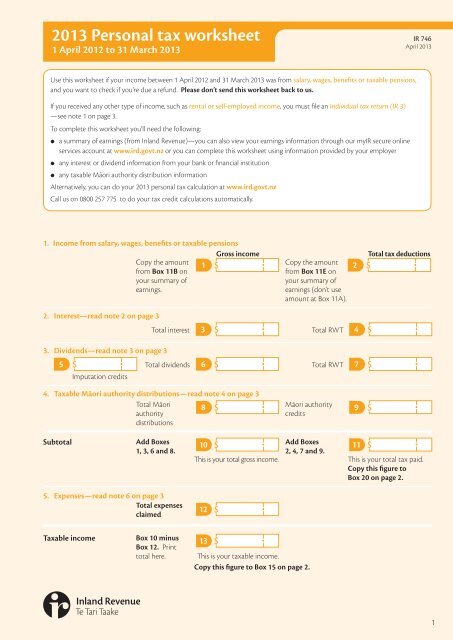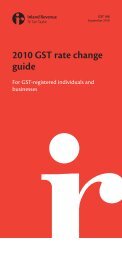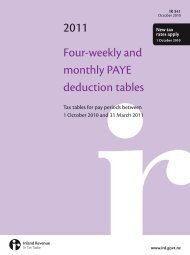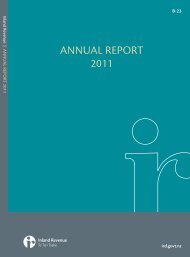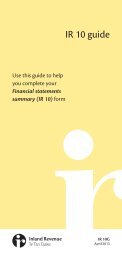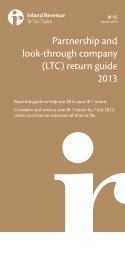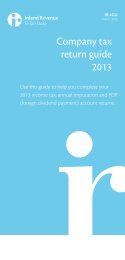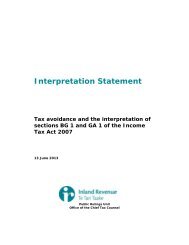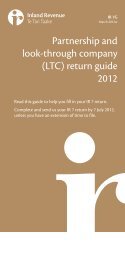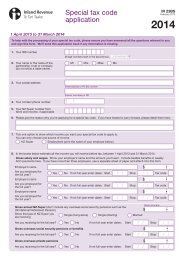2013 Personal tax worksheet - Inland Revenue Department
2013 Personal tax worksheet - Inland Revenue Department
2013 Personal tax worksheet - Inland Revenue Department
You also want an ePaper? Increase the reach of your titles
YUMPU automatically turns print PDFs into web optimized ePapers that Google loves.
6. Independent earner <strong>tax</strong> credit—read note 7 on page 3.Is your income at Box 13 between $24,000 and $48,000?No You can’t claim this <strong>tax</strong> credit. Print your <strong>tax</strong> credit here.Yes To work out your <strong>tax</strong> credit entitlement, see note 10 on page 4. 14 $7. Tax calculation Copy your <strong>tax</strong>able income from Box 13. 15 $Work out your <strong>tax</strong> on <strong>tax</strong>able income,see note 10 on page 4.16 $Copy your total <strong>tax</strong> credits from Box 14. 17 $Box 16 minus Box 17. Print total here(if Box 17 is larger than Box 16 print nil).Copy your total dividend imputation credits from Box 5. 19 $18 $Copy your total <strong>tax</strong> paid from Box 11. 20 $Add Boxes 19 and 20. Print total here. 21 $Add any extinguished (reversed) <strong>tax</strong> credit for payrolldonations (TCPD) at Box 22. Read note 9 on page 3.22 $Box 21 minus Box 22. Print total here. 23 $If Box 18 is more than Box 23, please stop here. You would have <strong>tax</strong> to pay, but as this is a voluntary <strong>worksheet</strong> you don’t haveto take any further action.If Box 23 is more than Box 18, you are due a refund and should continue. The difference between these amounts is yourestimated refund.Box 23 minus Box 18. Print total here. 24 $This is your estimated refund.What to do nextIf you’ve worked out that you’re entitled to a refund, you’ll need to request a personal <strong>tax</strong> summary (PTS), see note 11 on page 4.If you’ve worked out that you have <strong>tax</strong> to pay, you don’t need take any further action.Note This <strong>worksheet</strong> is your calculation of your <strong>tax</strong> to pay or refund. If you request a personal <strong>tax</strong> summary the outcomemay be different from what you’ve calculated using this <strong>worksheet</strong>.Please don’t send this form back to us.2
Notes1. IncomeYou need to file an Individual <strong>tax</strong> return (IR 3) if, during1 April 2012 to 31 March <strong>2013</strong> you:• received income other than salary, wages, pensions, benefits,interest, dividends or <strong>tax</strong>able Māori authority distributions(for example, rental, self-employment or overseas income)• changed your balance date part-way through the year• received overseas interest and dividends of more than $200• are an IR 56 <strong>tax</strong>payer* and received any of the above income• had a loss or excess imputation credits carried forward fromthe 2012 <strong>tax</strong> year.You will also need to file an IR 3 if you are filing a return for adeceased person to the date of death (if there’s a requirementto file a return for this <strong>tax</strong> year).If you would normally be required to receive a PTS and you:• left or arrived in New Zealand part-way through the year, or• were declared bankrupt part-way through the yearyou will need to file an IR 3.*For more information about IR 56 <strong>tax</strong> payers go towww.ird.govt.nz (keywords: special types of workers).If you need an Individual <strong>tax</strong> return (IR 3), go to www.ird.govt.nzor call us on 0800 775 247 and say “request IR 3” whenprompted.2. InterestYou only need to tell us about interest income if the total wasgreater than $200 and it wasn’t <strong>tax</strong>ed at the correct rate, or ifyou are liable for child support.Your bank statement or interest certificate will show what rateof <strong>tax</strong> has been deducted from your interest. Your interestwould have been <strong>tax</strong>ed at the correct rate if:• your total income was $48,000 or less, and <strong>tax</strong> wasdeducted at 17.5%• your total income was between $48,001 and $70,000, and<strong>tax</strong> was deducted at 30%• your total income was over $70,001, and <strong>tax</strong> was deductedat 33%.3. DividendsYou only need to tell us about dividend income if the total wasgreater than $200 and it wasn’t <strong>tax</strong>ed at the correct rate, or ifyou are liable for child support.All dividends have <strong>tax</strong> deducted at 33%.4. Taxable Māori authority distributionsMāori authorities will give you a Māori authority distributionstatement which shows the amount of <strong>tax</strong>able distributionsreceived and credits attached. Distributions have <strong>tax</strong> deductedat 17.5%.You only need to tell us if you received more than $200 indistributions and your total income was over $48,000.5. Student loansYou need to tell us if you have any interest, dividends, <strong>tax</strong>ableMāori authority distributions, casual agricultural income orelection-day income that is $1,500 or more and your totalincome (including any other salary or wages) is $1,500 or moreabove the annual repayment threshold, and you didn’t becomea new borrower on or after 1 January of that <strong>tax</strong> year.6. ExpensesYou can only claim the following expenses:• a fee paid to someone for completing your <strong>tax</strong> return• commission on interest or dividend income (but not bank fees)• interest on money you borrowed to buy shares or to invest,as long as the investment will produce some income that is<strong>tax</strong>able• premiums on loss of earnings insurance, as long as thebenefit for the insurance policy is <strong>tax</strong>able income• Interest paid to <strong>Inland</strong> <strong>Revenue</strong> for late payment of <strong>tax</strong> inthe income year it is paid.7. Independent earner <strong>tax</strong> credit (IETC)The IETC is a <strong>tax</strong> credit for individuals whose annual net income*is between $24,000 and $48,000.For the period 1 April 2012 to 31 March <strong>2013</strong>, you’ll be entitledto the IETC for any months where:• you were a New Zealand <strong>tax</strong> resident, and• you or your partner weren’t entitled to Working for FamiliesTax Credits (or receiving an overseas equivalent)and you didn’t receive:• an income-tested benefit• NZ Super• a veteran’s pension, or• an overseas equivalent of any of the above.To work out the months you’re entitled to this <strong>tax</strong> credit, use thetotal number of whole months in which the above criteria applied.Note: If you didn’t meet all of the above criteria for even oneday of any month, you won’t be entitled to the IETC at all forthat month, so don’t include it in your calculation.* Net income means your total income from all sources less any allowabledeductions or current year losses (not including any losses brought forward).8. Imputation creditsIf you received dividends from a company that gave youimputation credits, you may have imputation credits to carryforward. This will only happen if your imputation credits inBox 19 are more than the figure in Box 18.If Box 19 is more than Box 18 we can’t refund the difference.The excess imputation credits must be carried forward to thenext <strong>tax</strong> year. If this applies to you, your personal <strong>tax</strong> summarywill confirm the amount to be carried forward. You’ll need tocomplete an Individual <strong>tax</strong> return (IR 3) in 2014 to claim yourexcess imputation credits.9. Extinguished <strong>tax</strong> credit for payroll donationsAn extinguished <strong>tax</strong> credit for payroll donations (TCPD) is whenyour donation <strong>tax</strong> credits have been reduced. A reduction canoccur when a donation made is later reversed. You will havereceived notification if this has happened and the extinguishedTCPDs will also show on your summary of earnings and PTS.3


